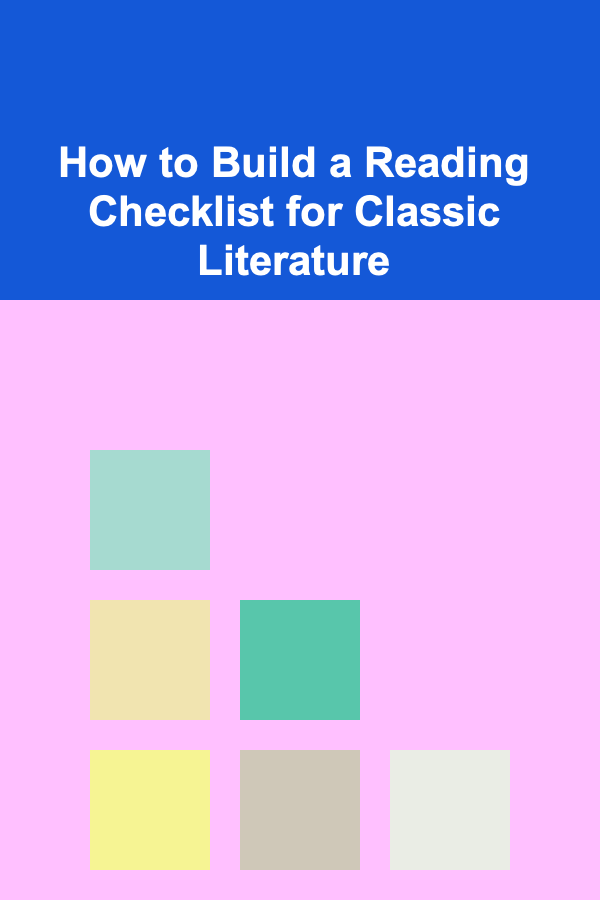
How to Build a Reading Checklist for Classic Literature
ebook include PDF & Audio bundle (Micro Guide)
$12.99$11.99
Limited Time Offer! Order within the next:

Reading classic literature is an enriching experience that not only offers insight into the past but also enhances our understanding of human nature, society, and culture. The works of classic authors like William Shakespeare, Leo Tolstoy, and Jane Austen provide timeless narratives, complex characters, and deep philosophical insights. However, with the vast array of classic works available, it can be challenging to know where to start and how to structure your reading journey.
In this article, we will explore how to build a comprehensive and effective reading checklist for classic literature. Whether you're a beginner or a seasoned reader, this checklist will guide you in curating a balanced, meaningful collection of works that span different genres, periods, and styles.
Understand the Importance of Classic Literature
Before diving into the process of creating a checklist, it's essential to understand why classic literature is significant. Classics are not merely old books that have stood the test of time; they offer timeless themes and ideas that continue to resonate with readers today. These works have often shaped modern literature, influencing various authors, movements, and cultural shifts.
Classic literature provides:
- Cultural Insight: Works from different historical periods offer insights into the societies, values, and ideologies of their time.
- Philosophical Exploration: Many classics tackle deep questions about human existence, morality, and the nature of reality.
- Literary Value: Classic authors often experiment with form, style, and narrative technique, making these works a treasure trove of literary innovation.
Understanding the importance of these works will help you appreciate the richness of the reading experience and motivate you to dive deeper into the texts.
Consider Different Genres
Classic literature spans a wide range of genres, each offering a unique reading experience. When building your checklist, consider including works from several different genres to keep your reading journey varied and interesting.
Here are some key genres to explore:
- Novels : Often at the heart of classic literature, novels offer deep character studies and rich plots. Some essential works include Pride and Prejudice by Jane Austen, Crime and Punishment by Fyodor Dostoevsky, and Moby-Dick by Herman Melville.
- Poetry: Poetry offers a compact yet profound way to explore the human experience. Works by poets like William Wordsworth, Emily Dickinson, and John Keats provide emotional depth and lyrical beauty.
- Drama : Classic plays, particularly those by Shakespeare, are foundational to Western literature. Plays like Hamlet , Macbeth , and Romeo and Juliet explore themes of power, morality, and tragedy.
- Short Stories: Classic short stories are perfect for those who want a quick but impactful literary experience. Writers like Edgar Allan Poe, Anton Chekhov, and Franz Kafka are masters of the short story genre.
- Philosophical and Political Works : Books like The Republic by Plato, The Communist Manifesto by Karl Marx, and Walden by Henry David Thoreau explore profound political, social, and philosophical themes.
By including a variety of genres in your checklist, you'll experience the full range of human expression and creativity that classic literature offers.
Consider Historical Periods
Another important aspect to consider when creating your reading checklist is the historical periods represented in classic literature. Classic works are often deeply intertwined with the historical contexts in which they were written, so understanding the time period can enhance your appreciation of the text.
Here are some key historical periods to explore:
- The Ancient World : Works from this period often reflect the foundational myths, philosophies, and politics of early civilizations. Key texts include Homer's The Iliad and The Odyssey, as well as works by Plato and Aristotle.
- The Renaissance : A period of rebirth in the arts and humanities, the Renaissance produced some of the most influential works in literature. Shakespeare's plays, as well as Don Quixote by Miguel de Cervantes, are prime examples.
- The Romantic Period : The 18th and 19th centuries saw the rise of Romanticism, a movement that emphasized emotion, nature, and individualism. Works like Frankenstein by Mary Shelley and The Prelude by William Wordsworth capture the essence of this period.
- Modernism : Emerging in the early 20th century, Modernism challenged traditional narratives and forms. Classic modernist works include Ulysses by James Joyce and The Waste Land by T.S. Eliot.
By including works from different periods, you'll gain a better understanding of how literature has evolved over time, reflecting changing societal values and artistic movements.
Explore Diverse Perspectives and Cultures
Classic literature is often dominated by Western writers, but it is essential to include works from different cultures to gain a more comprehensive understanding of the world. Many classic authors from non-Western traditions have written profound works that offer unique perspectives on life, philosophy, and society.
Here are some authors and works from diverse cultures to consider:
- China : Journey to the West by Wu Cheng'en is a fundamental work in Chinese literature, combining elements of adventure, religion, and folklore.
- India : The Mahabharata and Ramayana are epic narratives central to Indian literature, exploring themes of duty, morality, and spirituality.
- Africa : Chinua Achebe's Things Fall Apart provides a critical perspective on colonialism and the clash of cultures in Africa.
- Latin America : Works like Gabriel García Márquez's One Hundred Years of Solitude and Jorge Luis Borges's short stories showcase the magical realism and philosophical explorations of Latin American literature.
Including diverse perspectives on your reading checklist will enrich your understanding of the world and offer fresh, thought-provoking insights into universal themes.
Focus on Themes and Motifs
As you build your checklist, consider the themes and motifs that resonate with you. Classic literature often explores timeless human concerns such as love, death, freedom, and power. Focusing on these themes will help you select works that speak to your interests and values.
Here are some common themes in classic literature:
- Love and Relationships : Works like Pride and Prejudice and Anna Karenina delve into the complexities of love, marriage, and societal expectations.
- Identity and Self-Discovery : Many classic works, such as The Catcher in the Rye and The Picture of Dorian Gray, focus on the search for personal identity and the consequences of self-exploration.
- Social Justice and Inequality : Books like The Grapes of Wrath and The Jungle by Upton Sinclair address the struggles of the working class and the fight for social change.
- Death and Existentialism : Works like The Trial by Franz Kafka and No Exit by Jean-Paul Sartre explore the existential anxieties surrounding life, death, and the meaning of existence.
By selecting works with similar themes, you can engage in a deeper analysis of specific human concerns and develop a nuanced understanding of how different authors approach these issues.
Set Realistic Goals
Creating a reading checklist for classic literature is not about overwhelming yourself with a never-ending list of books. Instead, it's about setting realistic and achievable goals that will keep you motivated. Start by determining how much time you can realistically dedicate to reading each week and how many books you aim to complete in a year.
Here's how to break down your reading goals:
- Short-Term Goals: Set a target for reading one or two classic novels each month. This will help you steadily progress through your checklist without feeling overwhelmed.
- Long-Term Goals: Aim to complete a specific number of books each year, such as 10 or 15, depending on your schedule and reading speed.
- Mix Difficult and Easy Reads: Some classic novels are long and dense, while others are shorter or easier to read. Balance challenging reads with lighter ones to keep your reading journey enjoyable.
Read with Purpose and Reflection
When reading classic literature, it's important to engage actively with the text rather than passively consuming it. Take notes, reflect on the themes, and consider how the work relates to your life and society today.
Here are some tips for purposeful reading:
- Take Notes: Jot down key ideas, quotes, and questions that arise while reading.
- Analyze the Text: Reflect on the characters, plot, and themes. Consider how the author's time period and personal experiences influenced their work.
- Join a Book Club or Discussion Group: Engaging in discussions with others can deepen your understanding and provide new perspectives on the book.
Mix Classic Works with Modern Influences
While focusing on classics is important, it can also be helpful to integrate modern literature that draws from these classical works. Contemporary writers often reference or reimagine classic texts, creating a bridge between the past and present.
Here's how to mix modern influences with your classic reading:
- Read Modern Retellings : Many classic stories have been retold with a modern twist, such as Jeanette Winterson's Written on the Body (a reimagining of Orlando by Virginia Woolf).
- Explore Literary Criticism: Reading literary criticism and analyses of classic works can provide new insights and interpretations that enhance your understanding.
By blending the old with the new, you can see how classic literature continues to shape the literary world today.
Track Your Progress
Tracking your progress is a great way to stay motivated and accountable as you work through your reading checklist. Keep a journal or digital log where you can record your thoughts on each book, the themes you found most engaging, and your personal reflections.
Consider using an app or website like Goodreads to track the books you've read and discover new ones. You can also join challenges to stay motivated and meet your reading goals.
Enjoy the Journey
Above all, remember that the process of reading classic literature should be enjoyable. Take your time with each book, savor the language, and immerse yourself in the world that the author has created. Classic literature is meant to be both a personal and intellectual journey, so enjoy every step of the way.
Conclusion
Building a reading checklist for classic literature is a rewarding and thoughtful process that allows you to engage deeply with some of the best works of the literary tradition. By considering genres, periods, cultural diversity, and key themes, you can curate a well-rounded and meaningful list that will enrich your reading experience. Whether you're reading for personal enrichment, intellectual growth, or sheer enjoyment, classic literature offers timeless lessons and lasting insights into the human condition.
Reading More From Our Other Websites
- [Soap Making Tip 101] Best Vegan Soap Making with Olive Oil: Recipes & Techniques for Sensitive Skin
- [Home Family Activity 101] How to Enhance Your Backyard Stargazing Experience with DIY Tips
- [Home Party Planning 101] How to Find Small Event Organisers for Your Next Home Party
- [Organization Tip 101] How to Display Art and Photos Without Cluttering Walls
- [Organization Tip 101] How to Maximize Efficiency: Using Both Jigsaw and Circular Saw in Your Toolbox
- [Metal Stamping Tip 101] Best Methods for Implementing Real‑Time Monitoring in Automated Metal Stamping Lines
- [Personal Finance Management 101] How to Optimize Your Taxes and Maximize Your Personal Finance Gains
- [Personal Finance Management 101] How to Build Wealth in Your 30s: A Step-by-Step Guide
- [Home Party Planning 101] How to Choose the Right Party Rental Equipment for Your Home Event
- [Home Cleaning 101] How to Clean Your Home While Protecting the Environment

How to Create an Efficient Home Office in a Small Space
Read More
How To Explore CRISPR for Agricultural Improvement
Read More
How to Organize Your Bathroom Products for Easy Use
Read More
How to Plan a Family DIY Movie Theater Experience at Home
Read More
How to Read Financial Statements to Make Smarter Investment Choices
Read More
How To Master Public Speaking for Small Business Events
Read MoreOther Products

How to Create an Efficient Home Office in a Small Space
Read More
How To Explore CRISPR for Agricultural Improvement
Read More
How to Organize Your Bathroom Products for Easy Use
Read More
How to Plan a Family DIY Movie Theater Experience at Home
Read More
How to Read Financial Statements to Make Smarter Investment Choices
Read More